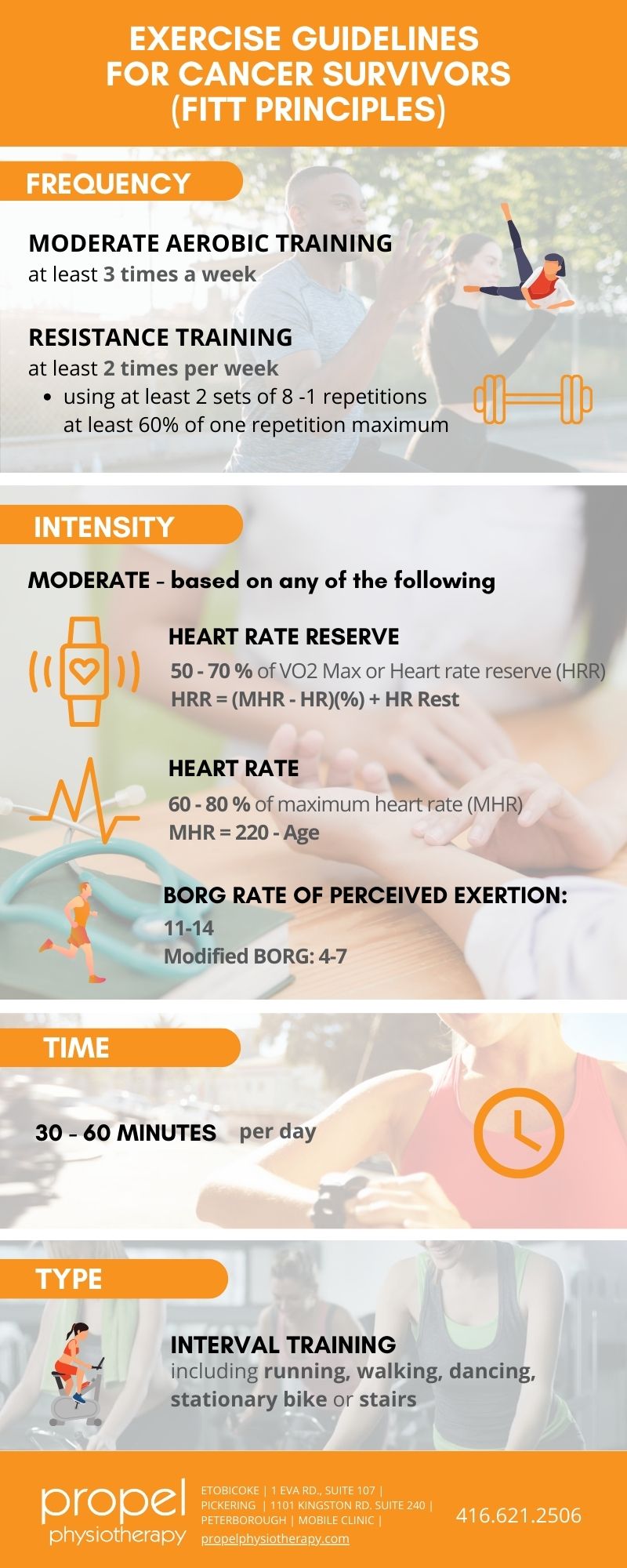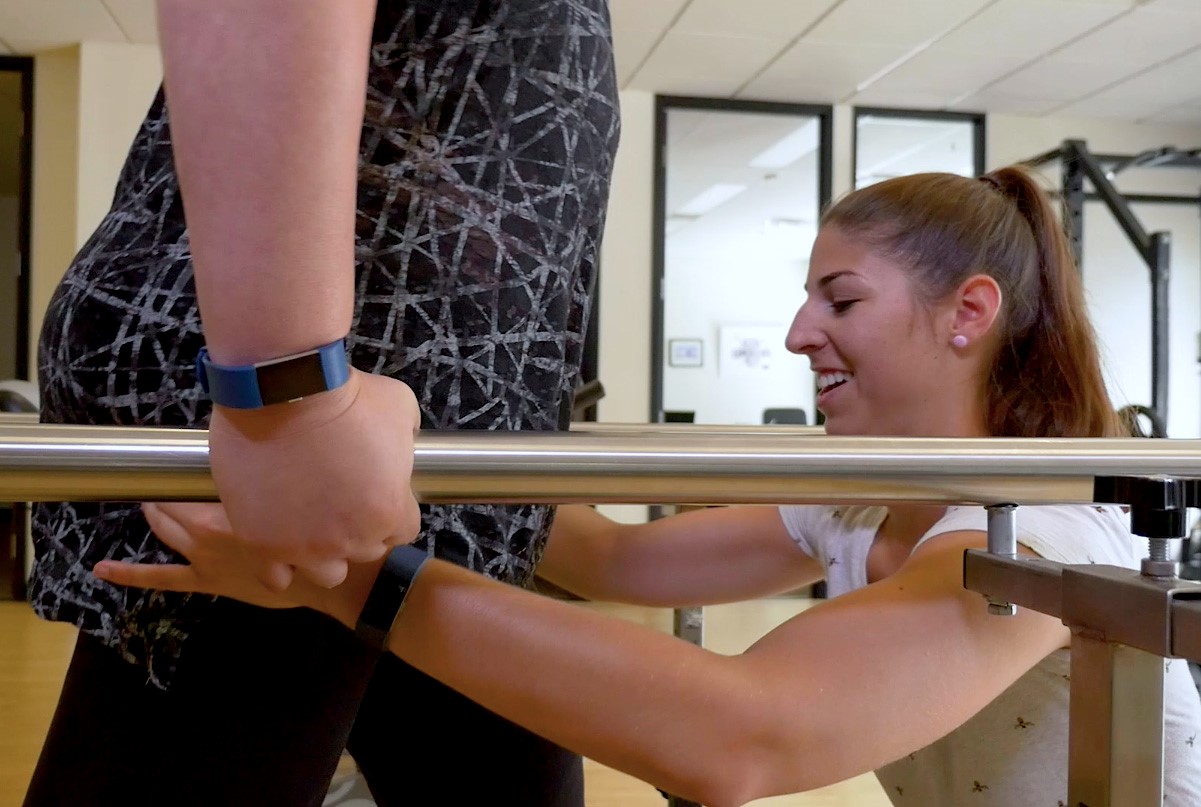Gone are the days when cancer patients were told to rest during and after cancer treatments. Research has shown conclusively that exercise has numerous benefits for cancer prevention, as well as during and after cancer treatment.
Due to increased screening and education as well as medical treatment advances, a greater number of cancer patients are living longer. Many types of cancer are now seen as a chronic illness that can be managed and controlled. With an estimated 2 in 5 Canadians (44 percent of men and 43 percent of women) expected to develop cancer during their lifetime,[i] exercise can be an effective tool in helping bring these rates down and improve the quality of life and overall health for people living with cancer.
In this article we will look at the benefits of exercise for prevention, during and after cancer treatment, precautions to consider when prescribing exercise and guidelines for this population.
Benefits of Exercise for Cancer Prevention
There is strong evidence to suggest that higher levels of physical activity are linked to lower risks of certain types of cancer including bladder, breast, colon, endometrial, esophageal, and stomach cancers.[ii] Exercise plays a key role in cancer prevention through a variety of mechanisms. These include:
- Altering the levels of steroid hormones and growth factors that play a role in cancer development and progression
- Improved immune system function in stabilizing free radicals
- Stabilizing insulin blood levels
- Reducing inflammation
- Prevention of obesity[ii],[iii]
Benefit of Exercise During Cancer Treatment
Treatment for cancer can include a host of therapies including surgery, chemotherapy, radiation, immunotherapy, hormonal therapy, and stem cell therapy. These treatments can have harsh physical side effects including cancer pain, fatigue, weight loss, anemia, hair loss, lymphedema and nausea.
These side effects can be debilitating and lead to further consequences such as depression, anxiety decreased sleep and decreased quality of life. Research suggests that physical activity has numerous positive outcomes for cancer survivors during treatment. There is substantial evidence that both aerobic exercise and resistance training have positive effects on:
- Cancer related fatigue
- Depression and anxiety
- Sleep disruption
- Cognitive function
- Nausea
- Cardiopulmonary function
- Muscular strength and flexibility
- Body composition[iv]
Benefits of Exercise After Cancer Treatment
Physical activity is crucial to maintain after treatment to improve quality of life and overall health for people living with cancer. These improvements can lead to a longer and greater independence in mobility and function. Exercises can help manage the same side effects after treatment as well as help with other potential side effects such as lymphedema, osteoporosis and pain.[v] Physical activity has also been shown to lower the risk of cancer recurrence and mortality in certain types of cancers.[vi]
Precautions/Considerations for Exercise in Cancer Patients
Although the benefits of exercise for people with cancer remain widespread, certain precautions and considerations need to be taken to ensure safety. Situations that warrant precaution include:
- Changes in bloodwork – chemotherapy and radiation can cause low hemoglobin, platelets and red blood cells resulting in fatigue, increased bleeding and bruising
- Heart function – radiation can cause damage to the heart impacting heart function and resulting in arrhythmias; chemotherapy can also damage the cardiovascular system
- Neuropathy – chemotherapy can cause numbness or tingling in the feet and hands leading to altered sensation in these areas
- Bony Metastasis – a primary cancer that has spread to the bone can result in worsening pain, pain with weight bearing and pain at night
Communication between therapists and oncologists is important to ensure clearance to participate in a safe exercise program.
Guidelines for Cancer and Exercise (FITT Principle)
The American College of Sports Medicine Guidelines for Exercise and Cancer recommends the following training parameters:
Frequency: moderate intensity aerobic training at least 3 times a week; resistance training at least 2 times per week, using at least 2 sets of 8–15 repetitions at least 60% of one repetition maximum[vii]
Intensity: Moderate – any of the following
- 60 to 80% of max heart rate (MHR) (MHR = 220-age)
- 50 to 70% of VO2 max or heart rate reserve (HRR) (HRR = (MHR – HR rest)(%) + HR rest)
- Borg rate of perceived exertion 11-14 or Modified Borg 4-7
Time: 30 to 60 minutes per day
Type: interval training including walking, stationary bike, stairs
At Propel Physiotherapy our therapists recognize the importance of exercise in all populations. Our trained and experienced therapists communicate regularly with specialists and other health care providers to determine the best and safest exercise plan tailored to meet your individual needs. Come see us today to help you maintain and improve your quality of life.
References
[i] Cancer statistics at a glance. Canadian Cancer Society
[ii] Physical Activity and Cancer, National Cancer Institute
[iii] WESTERLIND, KIM C. Physical Activity and Cancer Prevention—Mechanisms, Medicine & Science in Sports & Exercise: November 2003 – Volume 35 – Issue 11 – p 1834-1840 doi: 10.1249/01.MSS.0000093619.37805.B7
[iv] Mustian KM, Sprod LK, Palesh OG, et al. Exercise for the management of side effects and quality of life among cancer survivors. Curr Sports Med Rep. 2009;8(6):325-330. doi:10.1249/JSR.0b013e3181c22324
[v] Campbell, Kristin L et al. “Exercise Guidelines for Cancer Survivors: Consensus Statement from International Multidisciplinary Roundtable.” Medicine and science in sports and exercise vol. 51,11 (2019): 2375-2390. doi:10.1249/MSS.0000000000002116
[vi] Morishita S, Tsubaki A, Fu JB. Does physical activity improve survival and mortality among patients with different types of cancer? Future Oncol. 2017;13:1053-1055.
[vii] Campbell, Kristin L et al. “Exercise Guidelines for Cancer Survivors: Consensus Statement from International Multidisciplinary Roundtable.” Medicine and science in sports and exercise vol. 51,11 (2019): 2375-2390. doi:10.1249/MSS.0000000000002116
Written by


















